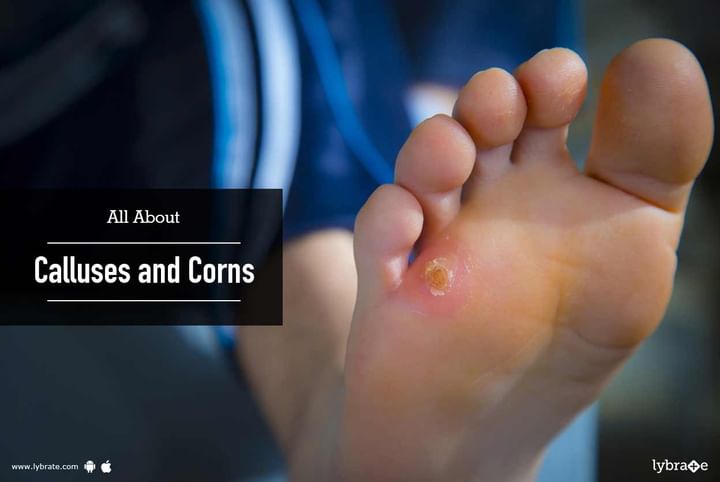All about Calluses and Corns
Corns and calluses are areas of stumpy skin caused by friction or pressure. They usually hurt when you wear shoes or walk.
Calluses generally develop on your feet or hands, and most of the time, don’t require treatment.
Corns have a hard or soft inner core. Soft corns are mostly found between the toes, while hard corns form on the top of the toes. Corns that are caused by ill-fitting shoes often reduce on wearing the right shoes.
Causes-
Repeated friction or pressure causes corns and calluses on areas of skin. The pressure leads to the death of the skin, which develops a protective, hard surface. Soft corns develop in a similar fashion. Corns and calluses are not formed due to viruses and are not harmful. They can be formed due to:
-
Regular usage of any object that puts strain on the hands, such as sports equipment (badminton racquet) or tools (hammer or gardening hoe), usually leads to calluses on the hands.
-
Pressure from wearing the wrong footwear usually leads to corns and calluses on the feet. Calluses can also form by walking barefoot.
-
Abnormal structures on the foot, such as hammertoe or bone spurs, can cause calluses and corns.
-
Repeated pressure from playing certain sports can also cause calluses on the feet.
Symptoms-
Corns and calluses on the feet are easy to spot. A callus is thick, hard and dry, and may appear yellowish or grey in colour. When touched, it will feel bumpy and more insensitive than the skin around it. A hard corn is thick and firm, while soft corns look like an exposed sore. The hard corn may have a grey centre with a light yellow ring around it.
Corns and calluses don’t hurt, but it does become painful when you are wearing shoes or walking. Fitting your feet into shoes gets more difficult due to them. Touching or squeezing the corn or callus can also be painful.
Treatment-
Corns and calluses don’t require treatment normally, but if they hurt, here’s what you can do:
-
Wearing well-fitting shoes that are roomy with deep and wide toe boxes (the area covering the toe).
-
Protective paddings, such as moleskin, toe separator, toe sleeves, etc., can alleviate pain.
-
Soaking the corn or callus in hot water, and then gently wear down the dead skin by using a pumice stone.
- Salicylic acid can be used to soften the corn or callus.
In case you have a concern or query regarding skincare consult doctor online, you can always consult the best dermatologist online & get the answers to your questions.



+1.svg)
